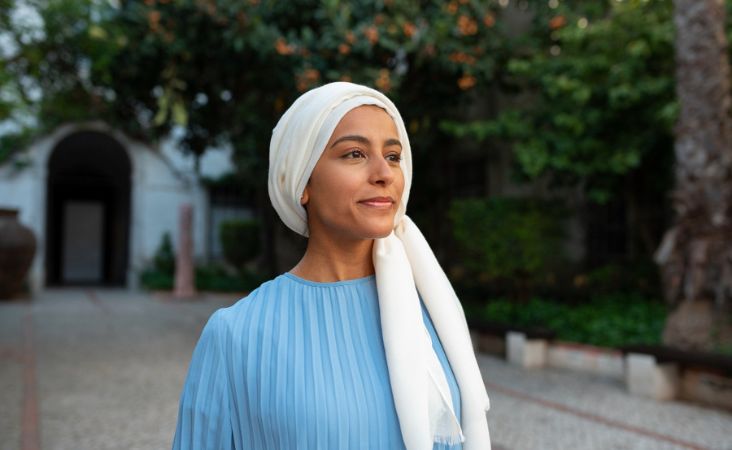Why Jewish Women Wear Wigs: History, Religion, and Beyond
- Written by Vivek Khullar
- Jan 24, 2024
- |
- 14 min read
 Listen to the full text
Listen to the full text
In 2024, human hair wigs have become a common solution for women addressing hair loss or seeking versatile styles without straining real hair. Even A-list celebrities like Lady Gaga, Nicki Minaj, and Kim Kadarshian flaunt glamorous wigs, effortlessly switching up their looks.
However, beyond the realms of fashion and aesthetics, there exists a unique community where wig-wearing holds profound significance. We are talking about none other than the Jewish community! Yes, you read it right. Donning wigs - referred to as sheitels in Yiddish - goes beyond personal preference among orthodox Jewish women.
In this blog, Lordhair - trusted globally for women's wigs and also men’s human hair wigs - will share everything about the history of Jewish women with hair wigs. From historical context to religious beliefs and evolving interpretations to the best hair wig provider, we will cover it all.
Are you ready to explore a captivating cultural practice that extends far beyond the realm of fashion and hair recovery? Let’s go!
What Are Jewish Hair Wigs?
Better known as sheitels, Jewish hair wigs hold a significant place in the lives of observant Jewish women. Beyond mere accessories, they serve as a religious and cultural expression meaning that women who wear sheitels adhere to specific guidelines outlined by Jewish law. These types of wigs are crafted with meticulous attention to detail and are specifically designed to provide modesty while aligning with religious principles.
The construction of Jewish hair wigs involves a precise process to meet both religious requirements and aesthetic standards. Typically made from natural human hair, sheitels undergo careful treatment to ensure a realistic appearance and feel. Manufacturers hand-tie individual strands of hair onto a wig cap. This delivers natural movement and a lifelike texture.
With lengths often falling below the collarbone to maintain a sense of decorum, the Jewish wig's construction also considers modesty. This artistry extends to the hairline where a delicate lace front mimics the appearance of natural hair growth.
For orthodox Jewish women, hair wigs are not merely accessories but are integral to maintaining a balance between religious tradition and personal appearance.

Why Do Jewish Women Wear Wigs?
Now that we've delved into the intricacies of hair wigs, understanding why orthodox Jewish women choose to wear these distinctive pieces doesn’t just become a compelling exploration of tradition but also faith and personal choice.
The reasons behind this practice are multifaceted. They are rooted in religious beliefs and cultural norms that have been passed down through generations. Here are some reasons why Jewish women adhere to the tradition of wearing hair wigs:
Modesty and tzniut: Modesty (also known as tzniut) is a cornerstone of Orthodox Judaism. Wearing human hair wigs enables women to fulfil this principle. By concealing their natural hair, they present themselves with a sense of humility and privacy in adherence to religious guidelines.
Marital intimacy: Rooted in biblical interpretations, wig-wearing symbolizes the sacred nature of marital intimacy. By covering their hair, married Jewish women signify their commitment to their spouses. Put simply, it emphasizes the exclusivity and sanctity of the marital bond.
Cultural identity: Wearing wigs becomes a visual affirmation of cultural identity. They provide a tangible marker of adherence to Orthodox Jewish values and traditions. Wigs also serve as a distinctive feature, fostering a sense of belonging within the community.
Spiritual focus: Another reason why Jewish women wear human hair wigs! The tradition of covering strands is looked at as a means of redirecting focus from physical appearance to spiritual matters. By concealing their natural hair, Jewish ladies aim to cultivate a deeper connection to their faith. Hair wigs allude to inner qualities over external aesthetics.
Halachic observance: For those who don’t know, the decision to wear wigs aligns with specific interpretations of Jewish law known as halacha. It's not merely a personal choice but a religious obligation for many Orthodox Jewish communities. It reflects their commitment to observing and upholding the laws and traditions of their faith.
Want to improve the quality of your real hair? Check out these resources as well:
- Basic hair care system for men and women
- Treatments for dry and brittle hair
- A guide on how real human hair wigs are made
Where Does the Practice of Wearing Wigs Come From?
Let's take a look at where the practice of wearing human hair wigs among Jewish women came from and look at where it all started. The roots of covering hair among Orthodox Jews can be traced back to the Sotah ritual detailed in the Bible.
This ancient ceremony has been designed to test the fidelity of a woman accused of adultery. It involves the priest uncovering or unbraiding the accused woman's hair as part of the pre-ceremonial humiliation (Numbers 5:18). The Talmud (Ketuboth 72) interprets this act as establishing a biblical requirement for women to cover their hair under normal circumstances.
However, the Mishnah in Ketuboth (7:6) introduces a nuanced perspective. It suggests that hair covering may not be an inherent biblical obligation. It classifies behaviors related to hair exposure as violations of Dat Yehudit or Jewish rule rather than Dat Moshe and Mosaic rule. This indicates that the practice stems from communal norms rather than a direct mandate from Moses at Sinai.
The Talmud (Ketuboth 72) further refines its stance, proposing a compromise position: While minimal hair covering is deemed a biblical obligation, additional standards dictating how and when to cover one's hair are determined by the community. This reflects the intricate interplay between biblical mandates and evolving communal standards.
In another Talmudic passage (Berakhot 24a), the rabbis declare hair as sexually erotic (ervah) and forbid men from praying in sight of a woman's hair. This perspective derives from a biblical verse praising hair's sensual nature. Notably, the rabbis do not mandate the covering of the face. This highlights the subjective nature of communal norms. This has been emphasized by the medieval German commentator Mordecai Ben Hillel Hakohen.
Historically, anecdotes from the Talmudic period suggest that women likely covered their hair, with social norms influencing legal judgments. As the Middle Ages unfolded, Jewish authorities (such as Maimonides) reinforced the practice based on the Sotah story, despite its absence from the list of 613 commandments.
The Shulchan Aruch and Zohar further solidified the tradition, emphasizing the mystical importance of complete hair coverage, especially for married women.
This historical journey illuminates the dynamic intersection of biblical origins, communal norms, and mystical beliefs that have shaped the practice of covering their hair among Orthodox Jewish women.
Can Jewish Women Wear Wigs Before Marriage?
As we said earlier, the tradition of Jewish women wearing wigs is closely tied to marital status. Unmarried Jewish women are not conventionally required to cover their hair in the same manner as their married counterparts. The emphasis on hair covering is often seen as a symbol of marital commitment and the sanctity of the union.
However, contemporary practices among Jewish communities may vary. Some unmarried women choose to adopt the practice of wearing wigs voluntarily as a personal expression of modesty or adherence to cultural traditions. In certain communities, especially those influenced by more stringent interpretations of religious laws, unmarried women may follow the custom of covering their hair to a certain extent (not as extensively as married women though).
In recent times, the practice of wearing wigs has evolved beyond its traditional confines. While it remains a symbolic and religious tradition for many Jewish women, others have embraced wig-wearing for fashion and styling. Additionally, women facing hair loss issues often turn to full cap wigs and partial hairpieces as a practical and aesthetically pleasing solution.
Put simply, the versatility of wigs has transformed this practice into a broader cultural phenomenon. Women, regardless of marital status, can choose to wear wigs for various reasons. They can blend tradition with personal preference in the ever-evolving landscape of contemporary Jewish life!

Do Wigs Have to Be Kosher-Certified for a Jewish Woman to Wear Them?
The question of whether wigs must be kosher-certified for Jewish women to wear them has been an ongoing debate within the Orthodox Jewish community for a very long time. But just what is kosher? Let us tell you that this term refers to whether the wig meets specific religious guidelines in terms of its source and production.
While some Jewish authorities insist on kosher certification for wigs, others take a more lenient stance. Usually, the biggest concern is from where exactly the hair has been sourced while making the wig. Ideally, the hair should be sourced ethically which means it shouldn’t violate any prohibitions outlined in Jewish law.
The hair must come from individuals who willingly donated it or sold it without violating any religious principles. The debate also extends to the processing and manufacturing of the wig. Some argue that the entire production process (from the sourcing of the hair to the creation of the wig) should adhere to kosher standards. Others have to say that as long as the hair itself is ethically sourced, the wig may not necessarily need a specific kosher certification.
This shows that the decision to wear a kosher-certified wig varies among individuals and communities. Some women prioritize the religious sanctity of the hair unit and opt for kosher-certified options. Others may consider ethical sourcing and personal comfort as sufficient criteria.
Whether Jewish women choose to wear kosher-certified human hair wigs depends on their personal and religious preferences.
Who Can Jewish Women Buy Hair Wigs From?
When it comes to the not-so-insignificant matter of selecting a wig, particularly for Jewish women adhering to specific cultural and religious traditions, the source becomes paramount. For traditional women who wish to wear Kosher-certified wigs only, we recommend connecting with a certified wig supplier that deals in Jewish wigs.
If you are a Jewish woman looking for a premium wig that can be non-Kosher, we recommend browsing our catalog of hair wigs for women. Lordhair has emerged as a distinguished global wig manufacturer offering a comprehensive range of hair units tailored to meet the unique needs of Jewish women.
Renowned for our commitment to quality and customer satisfaction, we have become a trusted destination for those seeking not just a human hairpiece but a seamless blend of tradition and modernity.
Here are some reasons why you should buy hair wigs from us:
Premium quality materials: Lordhair stands out for its unwavering commitment to using premium materials. From the hair strands to the wig cap, every part is meticulously chosen by our experts to ensure the highest quality and comfort.
Ethically sourced human hair: Understanding the significance of ethical sourcing in the context of religious and cultural practices, we have ethically used unprocessed human hair in many hair wigs present in our catalog.
Customization options: While some women are content with stock models, others might want to alter their hair units to their taste. Recognizing the diverse preferences and needs of their customers, Lordhair offers a range of customization options. From hair texture to length, you can tailor your selected wig to match your style.
Artisan craftsmanship: With over 15 years of experience in the wig industry, we pride ourselves on artisan craftsmanship. Depending on the design, many of the wigs produced by our team undergo a meticulous hand-tying process. This helps us make sure that wearers get a natural look and feel.

Variety of styles: One of the biggest reasons to choose Lordhair in 2024. Whether seeking a wig for daily wear or special occasions, Lordhair provides an extensive array of styles. Looking for a natural-looking hair wig? We have it! Want a lightweight French lace wiglet? We got you covered!
Comfort and breathability: Understanding the importance of comfort, we design our wigs with breathable cap constructions. This helps us make certain that our Jewish customers can wear their wigs with ease and confidence throughout the day.
Educational resources: Lordhair goes beyond being a mere wig seller. Our website also serves as a wig and hair encyclopedia. We offer educational materials that will guide you through the process of selecting, wearing, and maintaining your human hair wigs!
Customer support and satisfaction: A hallmark of Lordhair is its unwavering commitment to customer satisfaction. With responsive customer support and a dedication to resolving queries and concerns promptly, we guarantee that every customer who visits our website will feel valued and supported in their wig journey.
Check out how amazing Kelly looks after wearing a top Lordhair hair wig!
Why Jewish Women Wear Hair Wigs: Final Words
We hope we covered all the critical questions regarding why Jewish women and their connection with human hair wigs. As you saw, the choice of wearing hair units goes beyond mere aesthetics in this culture. It reflects a profound connection to tradition, faith, and personal expression.
Lordhair, with its unwavering dedication to quality and customer satisfaction, strives to be the bridge between Jewish tradition and modernity in the realm of wig-wearing. As you embark on your journey with us, may your chosen wig from our catalog not only enhance your beauty but also serve as a testament to the rich tapestry of Jewish cultural heritage.
Do you have any questions regarding our human hair wigs? Contact us today and have them answered by our hair system experts!


